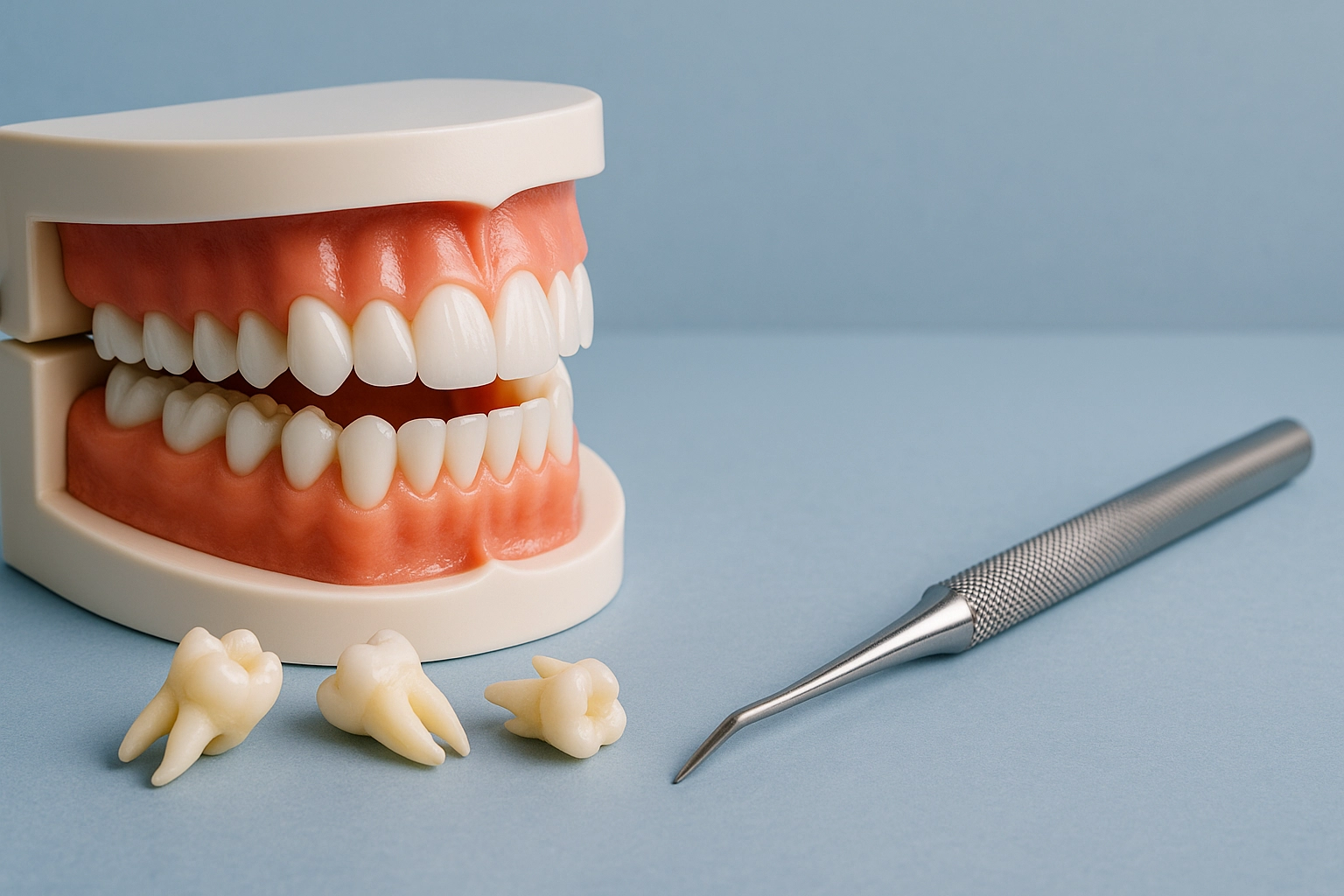
Wisdom Tooth Extraction in UK: What to Expect and How to Prepare
Wisdom teeth - your third molars - are the last adult teeth to come through, usually appearing in the late teens or early twenties. While they can erupt without issue for some, they often pose challenges that require professional attention.
At Brighton Implant Clinic, we’re committed to demystifying this process for patients by offering expert guidance from consultation to recovery. This guide explores everything you need to know about getting your wisdom tooth removed, so you can feel confident and prepared every step of the way.
Understanding Wisdom Teeth
Before diving into the details of extraction, it's important to understand what wisdom teeth are and why they often cause problems.
What Are Wisdom Teeth?
Wisdom teeth are the final set of molars that typically erupt between the ages of 17 and 25. Located at the very back of your mouth, you can have up to four—one in each corner. They were once vital for grinding down raw plants and meat, but as our diets and jaws evolved, many people no longer have space for them.
Some individuals never develop wisdom teeth, while others may have one, two, or even all four. Their unpredictable appearance makes regular dental monitoring essential.
Common Issues with Wisdom Teeth
While they don’t always cause issues, wisdom teeth often become problematic due to lack of space in the jaw. This can lead to:
- Impacted teeth (partially or fully trapped in the gums)
- Crowding of existing teeth
- Infection and decay due to difficulty cleaning the area
- Cyst formation around the tooth
Early detection of these problems through routine check-ups can prevent more complex issues later.
Reasons for Wisdom Tooth Extraction

Understanding why a dentist or oral surgeon may recommend extraction helps clarify when this procedure is truly necessary.
Preventive Measures
In some cases, wisdom teeth don’t cause immediate problems but still pose long-term risks. Extracting them early can:
- Prevent crowding of other teeth (especially after orthodontic treatment)
- Avoid painful impactions
- Eliminate the risk of developing cysts or infections around the tooth
Early removal, especially in your late teens or early 20s, typically results in a quicker and smoother recovery.
Addressing Existing Problems
When wisdom teeth begin to cause pain, swelling, or infection, removal becomes urgent. Common signs include:
- Pain at the back of the mouth
- Swollen or bleeding gums
- Difficulty opening the mouth
- Bad breath or unpleasant taste
In these cases, removing the tooth is often the best way to preserve your oral health and prevent damage to nearby teeth.
Preparing for the Procedure

Once your dentist determines that extraction is needed, a proper preparation plan will ensure a safe and stress-free experience.
Consultation and Evaluation
Preparation begins with a detailed dental exam. At Brighton Implant Clinic, we use digital X-rays and 3D scans to assess the position of your wisdom teeth. This helps us determine whether a simple extraction is possible or if a referral to an oral surgeon is required.
Your dentist will also review your medical history and current medications to minimize risk.
Pre-Surgery Instructions
You’ll receive tailored instructions based on the type of anesthesia used. These may include:
- Fasting for at least 6–8 hours prior to surgery (for sedation or general anesthesia)
- Avoiding smoking or alcohol
- Arranging transportation, as you may not be fit to drive post-procedure
Following these guidelines is essential to ensure both safety and comfort.
The Extraction Process
Knowing what happens during the procedure can significantly reduce anxiety and help you feel more in control.
Types of Anesthesia
Depending on your comfort level and the complexity of the extraction, you’ll receive one of the following:
- Local anesthetic: Numbs only the extraction site
- IV sedation: Induces a relaxed, sleepy state without full unconsciousness
- General anesthetic: Puts you to sleep entirely (used for more complex cases)
Your dentist or oral surgeon will explain the best option for your situation.
Step-by-Step Procedure
The extraction process generally involves the following:
- Gum incision (if the tooth is impacted)
- Bone removal if necessary to access the tooth
- Sectioning the tooth if it’s easier to remove in pieces
- Tooth removal
- Cleaning the site
- Stitches to aid healing
- Gauze placement to stop bleeding
Most extractions are completed in under an hour and are done on an outpatient basis.
Post-Operative Care

Recovery begins the moment your procedure ends. What you do in the first 24–72 hours will determine how smoothly the healing goes.
Immediate Aftercare
Expect some swelling and discomfort - but both are manageable. Your aftercare instructions will include:
- Bite on gauze to control bleeding
- Apply ice packs in 20-minute intervals
- Take prescribed painkillers like ibuprofen or paracetamol
- Avoid rinsing, brushing, or flossing near the site for the first 24 hours
Dietary Recommendations
For the first few days, stick to soft, cool foods like:
- Mashed potatoes
- Smoothies (no straws!)
- Yogurt
- Ice cream
Avoid spicy, crunchy, or hot foods that could dislodge the clot.
Oral Hygiene Practices
Starting 24 hours post-surgery, gently rinse your mouth with warm saltwater several times a day. Avoid brushing directly on the extraction site until fully healed. Maintaining cleanliness is essential to prevent infection.
Potential Complications
Though wisdom tooth removal is a routine procedure, understanding possible side effects prepares you for what to expect.
Dry Socket
One of the most common complications, dry socket happens when the protective blood clot is lost, exposing the bone. It can cause severe pain and delay healing.
To reduce your risk:
- Avoid smoking
- Skip straws
- Don’t brush the area vigorously
If dry socket occurs, contact your dentist for prompt treatment.
Infection and Nerve Damage
Infection may present as swelling, fever, or discharge from the extraction site. Antibiotics are usually effective.
Nerve damage, though rare, can occur if the tooth is close to the inferior alveolar nerve. This might lead to temporary or (rarely) permanent numbness in the chin, lips, or tongue.
Recovery Timeline
Healing progresses through several stages. Here's a general timeline:
Bone healing continues for several months. Your dentist will advise when follow-up visits are needed.
Long-Term Oral Health
The benefits of extraction extend far beyond the initial healing period.
Importance of Follow-Up Visits
Your dentist will want to monitor the healing site, remove non-dissolving stitches (if any), and check for complications like infection or delayed healing.
These appointments are also a chance to discuss any other dental concerns you may have.
Maintaining Oral Hygiene
After recovery, regular brushing, flossing, and biannual cleanings are your best defense against future dental issues. Keeping your remaining molars clean is especially important, as the back of the mouth can be harder to reach.
Myths and Facts About Wisdom Tooth Extraction
Despite how common this procedure is, several myths still circulate.
- Myth: Everyone has wisdom teeth
Fact: Some people are born without them due to genetic factors. - Myth: Extraction is always necessary
Fact: If wisdom teeth are healthy and properly aligned, they may not need removal. - Myth: It’s a painful process
Fact: With modern anesthesia and aftercare, pain is usually mild and short-lived.
Educating yourself with facts reduces anxiety and helps you make confident health decisions.
Choosing the Right Dental Clinic For Wisdom Tooth Extraction
Having your wisdom teeth removed is a significant step for your oral health, and choosing the right clinic matters.
At Brighton Implant Clinic, we provide:
- Advanced digital imaging and diagnostics
- Highly skilled oral surgeons and implantologists
- Personalized care plans and sedation options
- Clinics in Brighton, Hove, Worthing, and Hailsham
We’re proud to offer safe, comfortable, and professional dental services that put your needs first.
FAQs
Is wisdom tooth extraction always necessary?
Not always. If the teeth are healthy, fully erupted, and aligned, removal may not be needed. However, regular monitoring is essential.
How painful is the procedure?
The extraction itself is painless due to anesthesia. Postoperative discomfort is normal but well managed with painkillers and rest.
What is the typical recovery time?
Most patients recover within 7–10 days, though full bone healing can take a few months.
Can I eat normally after the extraction?
Stick to soft foods for a few days. Gradually resume a regular diet once you're comfortable.
What are the signs of complications?
Watch for persistent pain, swelling, fever, or foul-smelling discharge. These may indicate dry socket or infection and warrant a dental visit.
Conclusion
Wisdom teeth can bring discomfort, dental risks, and long-term complications if left untreated. Whether you need them removed due to impaction or as a preventive measure, Brighton Implant Clinic ensures your experience is clinically safe and patient-focused.
From consultation to recovery, we’re here to support you with expert care, advanced technology, and a warm, understanding approach. Ready to take the next step? Book your consultation today and protect your smile for the future.










